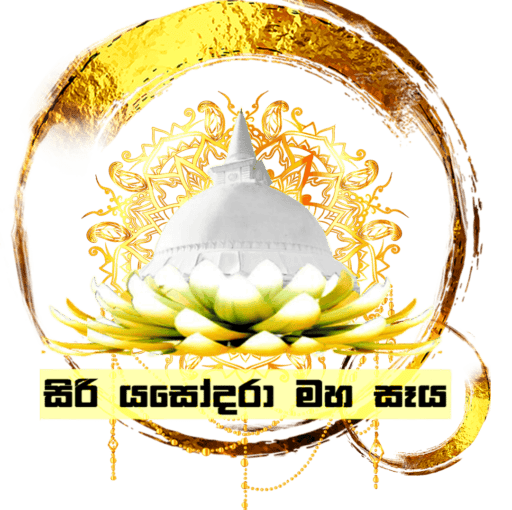Princess Suppavāsa, the Koliyan
-Mother of the Great Arahant Sīvali-
Her Past Aspiration
During the time of Buddha Padumuttara, Suppavāsā was reborn into a wealthy family in the city of Haṃsāvatī. While she was listening to a sermon of the Buddha, she saw a certain female lay disciple being named by the Buddha as the foremost in offering superior articles. She thus had a strong desire to become such a disciple in the future. After making extraordinary offerings, she aspired to that distinction in front of the Buddha, who predicted that her aspiration would be fulfilled in her future existence.
As Princess Suppavāsā, The Koliyan
After being reborn in either deva realm or human realm for a hundred thousand world-cycles, she was reborn as a princess of the Sakyan clan, in the city of Koliya. She was named Suppavāsā. When she was of marriageable age, she was given in marriage to a Sakyan prince. As the housewife in the household of the prince, she got the oppertunity to listen to a discourse of the Buddha which resulted in her attaining Stream-Entry. Later, she gave birth to a son, named Sīvali.
The Great Arahant Sīvali
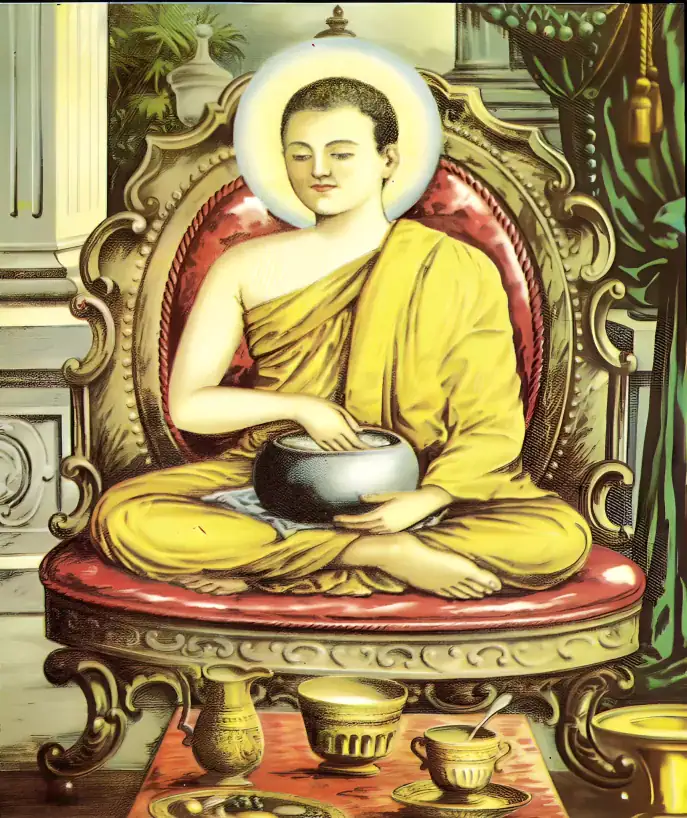
-
Save
Aspiration expressed in The Past
The clansman, who would become the Great Arahant Sīvali in future, one day went to the monastery to listen to a Dhamma discourse of the Buddha Padumuttara. There he stood at the edge of the audience, listening to the Buddha’s sermon. While he was doing so, he saw the Buddha declared a certain monk the ‘foremost among those who received abundant gifts.’ Thinking that he too should become one like that monk, he invited the Buddha to his house and offered a grand dāna for seven days. Thereafter, he declared his aspiration, saying to the Buddha:
“Exalted Buddha, as a result of this great act of merit, I do not want any other form of welfare but I want to be the foremost among those who receive many material gains, in the dispensation of a future Buddha, like the monk who was declared seven days ago.”
Foreseeing that the clansman’s wish would be fulfilled without any hitch, the Buddha predicted: “Your wish will be fulfilled in future in the dispensation of the Buddha Gotama.”
Life as A Countryman
Having performed meritorious deeds till his death, future Sīvali took rebirth only in the realms of devas and humans (without being reborn in the four woeful states).
During the lifetime of the Buddha Vipassī (who appeared ninety-one kappas ago), he became a clansman in a certain village not far away from the city of Bandhumati.
At that time, the citizens of Bandhumatī, in friendly competition with the King, discussed among themselves and gave a big dāna to the Buddha.
One day, when they gave a collective dāna, they inspected their offerings to see what was missing and discovered that there were no honey and milk curds. So they agreed to bring them from any possible place by all means and placed a man to watch the road leading to the city from the countryside.
Then came a villager, the future Sīvali, carrying a pot of milk curds from his village and thinking that he would exchange them for something he needed. But, before he entered the city, he wished to wash his face and hands and was looking for water everywhere but saw a beehive which was as big as the head of a plough but without bees. Believing that the beehive appeared because of his past act of merit, he took it and entered the city.
When the townsman, who was assigned to the road, saw the villager, he asked:
“For whom, friend, are you carrying this honey and these curds?”
“Sir, they are not for any particular person. In fact, I am carrying them to sell,” the villager answered.
“In that case, friend, take a coin from my hand and give me that honey and those curds,” said the townsman.
Then the villager thought: “These things, which I have brought now, is not much valuable, yet this man is buying them from me at a high price, even in his first offering. I do not know why?” So he said:
“I cannot sell them at this price, Sir.”
When the townsman increased the price, saying: “If you cannot sell them for one coin, please take two coins and sell the honey and the curds to me.”
The villager replied: “I cannot give them to you for two coins either,” in order to raise the price.
In this way the price became higher and higher until it reached a thousand coins.
Realizing: “It is not fair to prolong the deal on my part. However, I shall ask him about his purpose,” the villager said:
“The honey and the curds are not so valuable, yet, you unduly make such an immense payment. Why do you want to have these things by offering so much?”
The townsman told him the purpose: “In this royal city of Bandhumati, friend, the citizens in competition with their King, gave a grand dāna to Buddha Vipassī. While they are doing so, they do not have honey and curds among the items of their offering. So they are trying desperately to get them by any means. If they fail to get them, they will lose in their competition with the King. Therefore, I would like to have them by giving you a thousand coins.”
The villager then asked: “Sir, is such a charitable deed to be performed only by the people of the city and not by any village folk?”
The townsman then answered: “No man’s gift, friend, is prohibited, (everybody whether he belongs to town or village is entitled to give in charity).”
The villager then asked further: “O master, now that the citizens are performing acts of giving, is there anyone who gives away a thousand coins in one day?”
“No, friend, there is none.”
“O master, you know that the honey and the curds that I have brought now are worth a thousand coins, do you not?” the villager put still another question firmly.
“Yes, I do, friend.”
“O master,” said the villager, “in that case, go and tell the townsfolk that a rustic man is offering these two things, namely, honey and milk curds but not for money, instead he would like to make the offering by his own hands. Please also tell them that they should not be restless for wanting them and that they should now be happy as far as these two things are concerned. As for you, you should bear witness in person to the fact that in this magnificent dāna, it is I who is the donor of the most expensive item.”
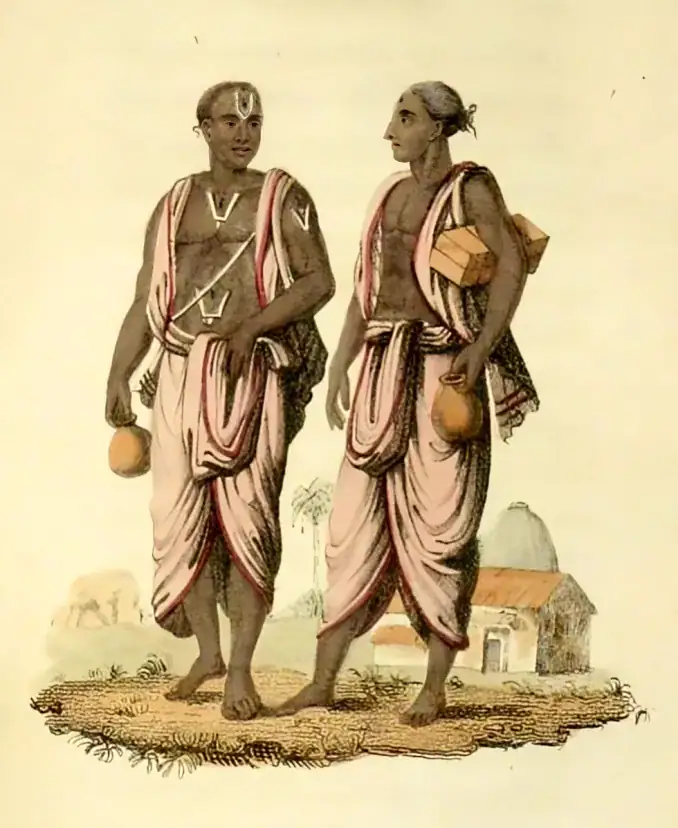
-
Save
Offering of Curd, & Honey mixed with Curd-water
Having said thus, the villager bought five perfumery ingredients with his money which were meant for his food. He made them into powder. Then he squeezed the curds to extract water from them. Into that water, he put honey by squeezing the beehive and then seasoned the mixture of honey and curd-water with the perfumery powder. Finally, he put the mixed liquid food in a lotus leaf (container). Having prepared the food properly, he brought it and sat down at a place that was not far from the Buddha, waiting for his turn to offer it.
Amidst all the offerings that were brought by the citizens, the villager, knowing that it was his turn to make his offering, approached the Buddha and requested, saying:
“Glorious Buddha, this offering is a gift from a poor man like me. Venerable Sir, kindly accept this humble gift of mine.”
Out of compassion for the villager, the Buddha received the offering with the marble bowl given by the four Divine Kings and resolved that the food should proved inexhaustible even after distributing it to sixty-eight hundred thousand bhikkhus.
When the Buddha had partaken His food, the villager respectfully made obeisance to Him and remaining at a suitable place, said:
“Glorious Buddha, all the people of the royal city of Bandhumati saw and knew that today I brought and made the offering to you. As a result of this act of merit, may I truly become, throughout saṃsāra, a great recipient of gifts, possessing a large retinue and fame. After saying: “Evaṃ hotu kulaputta” – May you do as you wish, clansman,” the Buddha gave an appreciative talk to the villager and citizens and then He returned to the monastery.
His Final Existence - Strange Happenings during Conception -
The villager, having done meritorious deeds till his death, was reborn only in celestial and terrestrial worlds, and finally, during the lifetime of our Buddha, he took conception in the womb of a Koliya Sakyan Princess named Suppavāsā.
Since his conception, hundreds of gifts arrived continuously, day and night, to his mother, Princess Suppavāsā. The princess became wealthier than before. (five hundred gifts came by day and five hundred by night.)
Then one day, in order to investigate the fortunate fate of the Princess, her royal relatives had the baskets of seeds touched by her hand. When these seeds were scattered, thousands of sprouts appeared from each seed. A plot of land, measuring a royal pai, yielded fifty or sixty cartloads of paddy.
Also, at a time when the crop was put into the storehouse, they let the door of the storehouse touched by the hand of the princess. When removing the crop, the place from where it was taken out became full as before. This was because of the glorious act done in the past by the Prince who was conceived in the princess’ womb. Besides, when ladling the cooked rice from the full pot and uttering: “This is the fortune of the Princess and her baby,” and distributing the food to all visitors, their supplies never ran short. While these strange events were happening and the child was remaining in the mother’s womb, seven years had passed.
When the infant became mature day by day for seven years, seven months, and seven days (still in the mother’s womb), the princess had to suffer a lot due to being stuck with the baby in her womb for such a long time. She was suffering from severe pain all along and was always half dead, but only her weakened body, not at all her strong mind…..
That serious agony the princess forbear with no moaning but by reflecting on the attributes of the Buddha, the attributes of the Dhamma and the attributes of the Sangha as follows:
“Sammāsambuddho vato so Bhagavā yo imassa evarūpassa dukkhassa pahānāya dhammaṃ deseti—
—He, that Master of ours, the Exalted One, taught us abandoning all kinds of such suffering; that Master of ours has been perfectly Self-Enlightened indeed by attaining Omniscience and knowing the truths and all that is to be known!”
“Susukhaṃ vata taṃ nibbānaṃ, yatth’idaṃ evrūpaṃ dukkhaṃ na saṃvijjati—
—The Dhamma in which the slightest tinge of such suffering is absent, that Nibbāna-Dhamma is indeed extremely happy!”
“Suppaṭipanno vata tassa Bhagavato sāvakasamgho: yo imassa evarūpassa dukkhassa pahānāya patippanno—
—The Order of Bhikkhus, who are the disciples of the Exalted One, work hard for abandoning all kinds of such suffering; these disciples of the Exalted Buddha underwent (the threefold training) very well indeed!”
Reflecting on the attributes of the three entities, namely, the attributes of the Buddha, the attributes of the Sangha, and the attributes of the peaceful happiness of Nibbāna, the Princess bore the pains. (She controlled herself and desisted from experiencing the misery and torment of pregnancy and making moans by repeatedly meditating on the qualities of the Buddha, the Sangha, and Nibbāna.)
On the seventh day after seven years, seven months and seven days of pregnancy, the Koliya Princess Suppavāsā called her husband the Koliya Prince and thinking she would like to give alms while living, said:
“Go my lord! Tell the Exalted One about my happenings and give my invitation to the Master. Please note carefully all that had to say and transmit it to me!”
The Prince went and told the Buddha on what happened to Princess Suppavāsā. The Buddha then uttered:
“May the Koliya Princess Suppavāsā be sound and healthy. Being healthy herself, may she give birth to a healthy son!”
No sooner had the Buddha made the utterance, the Princess gave birth to a healthy son without any pain. Those, who were surrounding the Princess, changed their teary mood into a happy one and went to the Prince to give him the information about the new-born baby. The Prince, having listened to what the Buddha had said, paid respect to Him and returned to the village. When he saw the way the servants approaching him jubilantly, he became certain, thinking: “The word of the Exalted One seems to have come true.”
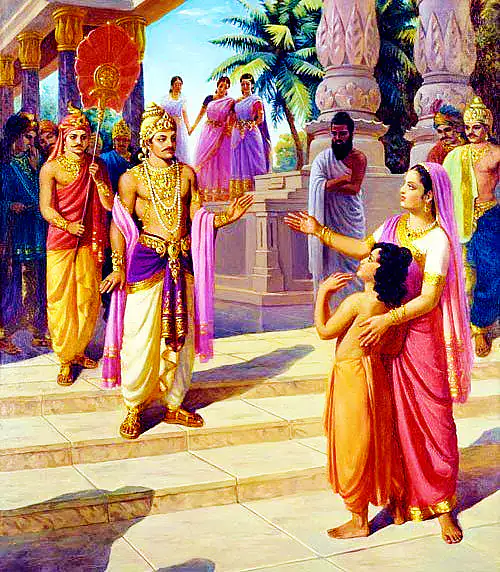
-
Save
He went to the Princess and transmitted the Buddha’s speech. The Princess said:
“My Lord, the life-saving alms-food to which you have invited, will be the meal of auspiciousness. Go again! Request the Buddha to come (and have a meal) for seven days.”
The Prince did as he had been told. They offered a grand dāna to the Buddha and His monks for seven days.
The boy was given the name “Sīvali”. Since he had stayed in the mother’s womb for seven years, from the time of his birth, he was able to do all that was to be done by the seven year old toddler. For instance, he purified the water by means of a filter and gave it to the monks during the mahā-dāna all week long.
On the seventh day, Venerable Sāriputta, the Marshal of the Dhamma, had a conversation with the boy. While doing so the Venerable Sāriputta asked:
“Sīvali, is it not befitting for you to become a monk after suffering all the trouble of such nature?”
“Venerable Sir, if only I get permission from my parents, I would like to become a monk,” the boy answered.
Seeing her son conversing with the Venerable Sāriputta, Sīvali’s mother thought:
“Look…what a marvelous! My son is speaking with the Venerable Sāriputta who is the Marshal of the Dhamma!”
So she joyfully approached the Venerable Sāriputta and asked him what they were talking about. The Venerable Sāriputta said:
“He talked to me about the misery caused by his stay in the mother’s womb and said me that he would live a celibate life if he gets permission from both his parents.”
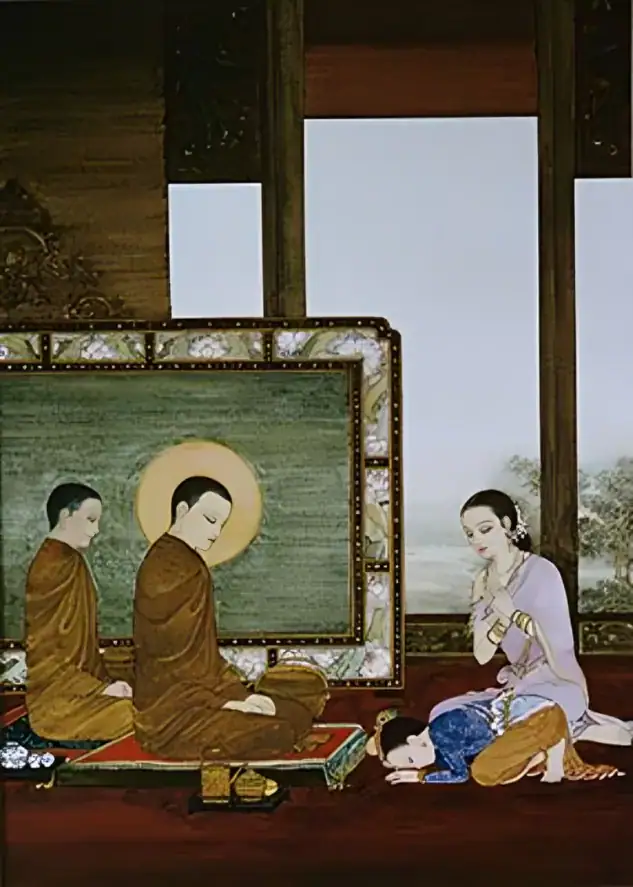
-
Save
The Princess then gave her permission replying: “Very well Venerable Sir…. Very well Venerable Sir, please do kindly make him a sāmaṇera.”
The Venerable Sāriputta then took the boy Sīvali to the monastery and when he was making him a sāmaṇera after giving him the meditation subject of taca-pañcaka (the five fold material aggregate with the skin as the fifth), he said:
“You do not need any other exhortation to follow. Just remember your pains that you had suffered for seven years.”
“Indeed Venerable Sir. Let me meditate on whatever I could recollect.”
The moment the shaving of hair for the first round was done, Sāmaṇera Sīvali was established in Sotāpanna-phala (stream-enterer), the moment the shaving for the second round of hair was done, he was established in Sakadāgāmi-phala (once-returner), the moment the shaving for the third round was done, he was established in Anāgāmi-phala (non-returner) and as soon as the shaving was completed, he attained arahatship. (The completion of the hair-shaving and the relation of Arahatship took place almost simultaneously.)
Since the day Sīvali was ordained a sāmaṇera, the four requisites, namely; clothing, food, dwelling and medicine became increasingly available to the Sangha.
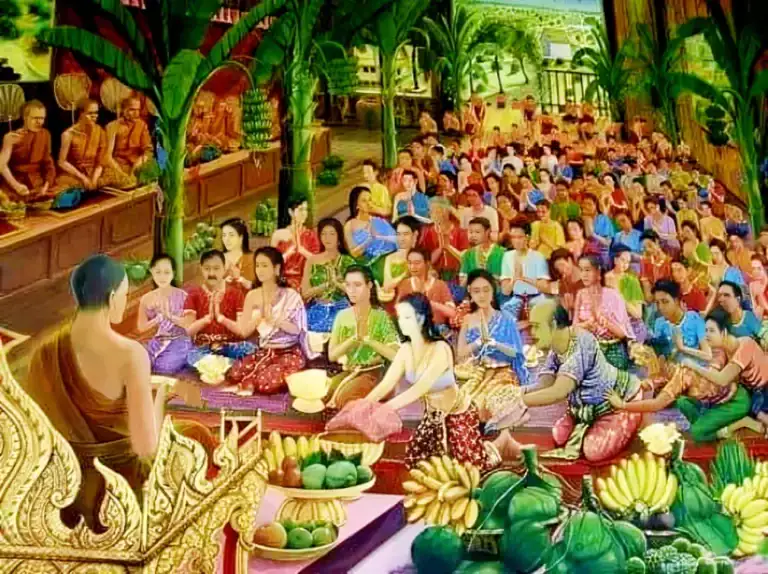
-
Save
At a later time, on one occasion, when the Buddha visited Venerable Khadiravaniya Revata, devas provided supplies, day after day, which were mainly intended for the Venerable Sīvali on the deserted and dangerous journey. With reference to that incident, the Buddha placed the Venerable the foremost among those who received plenty of gifts.
The Buddha spoke in praise of the Venerable by saying:
“Etadaggaṃ bhikkhave mama sāvakānaṃ bhikkhūnaṃ lābhīnaṃ yad’idaṃ Sīvali.”
“Monks, among my bhikkhu-disciple who receive the four requisites in abundance, Bhikkhu Sīvali is the foremost.”
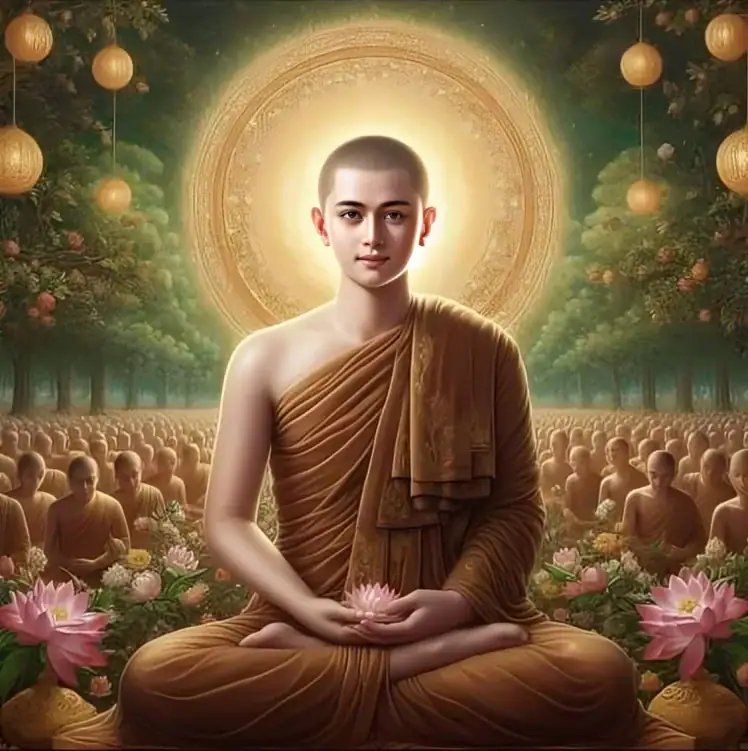
-
Save
The story of such miserable happenings befell on the Great Arahant Sīvali and his mother -Princess Suppavāsā, started in the city Bārāṇasī, many eons ago in long Saṃsāra. It is as follows.
The mother and the son, in one of the past existences were the Chief Queen and the son respectively to the King of Bārāṇasī. Once, the King of Kosala attacked Bārāṇasī King and took his Chief Queen and placed her in the same position. When the Bārāṇasī King was defeated and died, his son, the prince of Bārāṇasī, escaped through a drain. After organizing an army, he went back to the city of Bārāṇasī and gave an ultimatum asking the new King to return the city to him or he would wage a war.
The mother, who was inside the city, advised her son to besiege the city lest there should occur trouble to many people. In accordance with the mother’s advice, the Prince did so by blocking the four main gates so that there could be no exit or entrance. Though he did so for seven years, the citizens went out from smaller gates to collect grass, wood, etc. the blockage proved useless. Hearing that, the mother gave her son further advice to block the smaller gates as well.
When the Prince did, following his mother’s advice, the citizens found their movement about badly limited. Seven days later, they themselves trapped and beheaded King Kosala and offered the throne to the prince. The prince entered the city and crowned himself king. As a result of these aforesaid evil deeds, the son and the mother both had to suffer in hell for eons and, as a residue, faced their respective miseries in this very life.
Princess Suppavāsā as The Foremost Female Lay Disciple
At one time, Princess Suppavāsā, the mother of the Venerable Sīvali, offered choicest food to the Buddha and His Sangha. After finishing the meal the Buddha preached a discourse in appreciation of the special offering, He said:
“My female lay disciple Suppavāsā, in making this food offering, has in effect made five kinds of offering, namely, life, good appearance, happiness, strength and intelligence. Offering of life leads to longevity, either in the deva realm or in the human realm. Offering of good appearance, happiness, strength and intelligence leads to the blessing of good appearance, happiness, strength and intelligence (respectively) either in the deva realm or in the human realm.” This was the occasion that became the ground for the Buddha’s naming of foremost female lay disciple on Suppavāsā.
On another occasion, when the Buddha was residing in the Jetavana monastery in Sāvatthi, and was naming distinguished female lay disciple, He declared:
“Bhikkhus, among My female lay disciplewho make gifts of the choicest quality (who give delicious things), Suppavāsā, the Koliyan Princess, is the foremost.”
(From the book : The Great Chronicle of Buddhas | by Ven. Mingun Sayadaw)
